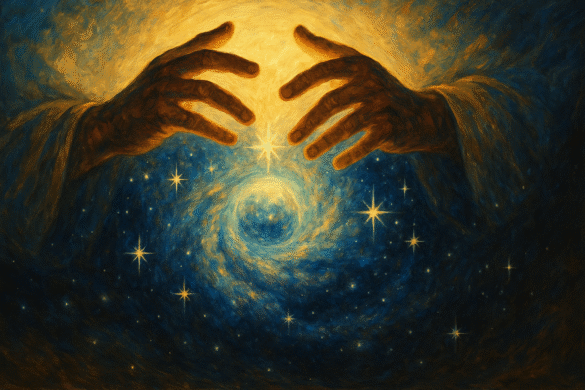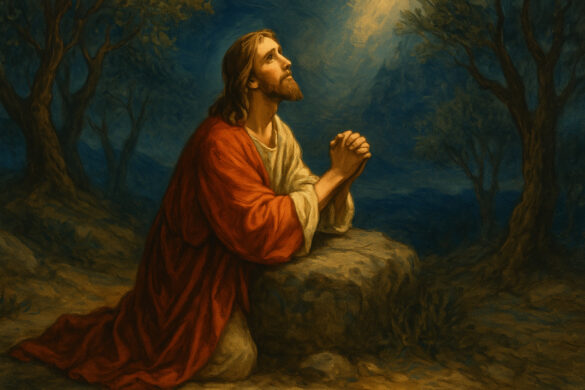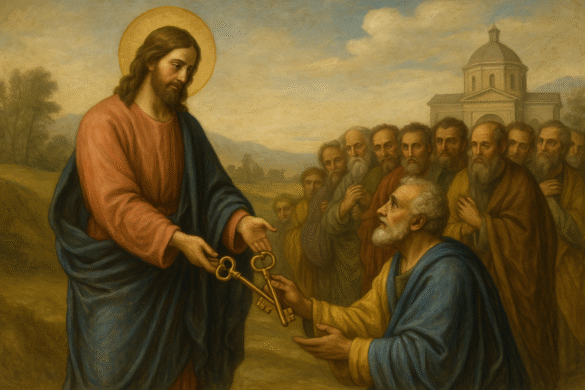God and Creation – Who is God? Why do we exist?

Before any doctrine, moral teaching, or religious practice, there is one essential question: Who is God?
And along with it, a timeless human longing: Why do we exist?
The Catholic faith is not based on abstract ideas, but on the revelation of a personal, loving, and eternal God — a God who creates out of love and calls each person into communion with Him. We are not accidents of chance. We were created with a purpose, and that purpose is to live with God.
This theme is the foundation of the entire Christian life. Without understanding who God is — and who we are before Him — the rest of the faith cannot be fully grasped. As we explore these questions, we not only discover truths about the Creator, but also about ourselves.
Click + to see the answer – God and Creation – Who is God? Why do we exist?
Who is God according to the Catholic faith?
God is the eternal, all-powerful Being who created all things visible and invisible. He is not an impersonal force but a personal Being who loves, knows, and acts. The Church teaches that God is One and Triune — Father, Son, and Holy Spirit — a perfect communion of love. He not only created the world but continues to sustain everything through His providence.
Why did God create us if He was already perfect and happy?
God did not create out of necessity, but out of love. He wanted to share His goodness and allow us to partake in His divine life. Creation is a free act of love. As the Catechism says (§1), “God, infinitely perfect and blessed in himself, in a plan of sheer goodness freely created man to make him share in his own blessed life.”
What is the meaning of life according to the Church?
The meaning of life is to know, love, and serve God in this life, so as to live with Him forever in the next. We are called to communion with God. This vocation is written in our hearts, and only in Him does the human being find true happiness.
Was the world created in six literal days?
The Church does not require the days of Genesis to be interpreted as literal 24-hour days. It is a symbolic and theological text that affirms core truths of faith: God created everything with order and purpose, and man is the pinnacle of creation. Faith and science are not in conflict, provided we acknowledge God as the Creator of all things.
Does God punish or love?
God loves deeply, but He is also just. Divine punishment is not an outburst of anger but a just consequence of sin. He teaches, corrects, and His justice is always united with mercy. Like a loving Father, He allows suffering to lead His children to conversion and salvation.
If God is good, why does evil exist?
Moral evil exists because God created us free. True love requires freedom, and this freedom can be used for good or evil. Physical evil (illness, disasters) is a consequence of a world wounded by original sin. Yet God is so good that He can bring good even out of evil — as He did through the Cross of Christ.
What is the Holy Trinity?
It is the central mystery of the Christian faith: one God in three distinct Persons — Father, Son, and Holy Spirit. They are not three gods, but one God in three eternal relationships of love. The Father begets the Son, the Son is eternally begotten, and the Holy Spirit proceeds from the Father and the Son. The Trinity is perfect communion.
Does God know everything we are going to do?
Yes. God is omniscient: He knows all our thoughts, choices, and what we will do. But this does not take away our freedom. His knowledge does not force our decisions. We remain fully free and responsible, even though He knows the future perfectly.
Is the human being more important than the rest of creation?
Yes. The human being is the only creature made in the “image and likeness of God” (Genesis 1:26). This means we have intelligence, free will, and the capacity to love. We were created to know and love the Creator, while all of creation exists in service of that purpose.
Do animals go to heaven?
The Church does not offer a dogmatic answer to this. Animals do not have rational souls like human beings, and thus do not possess spiritual immortality. However, the Catechism states that all creation will be “set free from corruption” (cf. Rom 8:21), and many theologians believe animals may be present in the new creation as part of man’s joy in God.
This is just the beginning of a deep and beautiful journey into the understanding of our faith.
We will continue adding more questions and answers on this topic over time, always remaining faithful to the teachings of the Church.
If you have a question you’d like to see here, feel free to send it to us — it might help many others as well.
Jesus Christ – The Center of the Catholic Faith

To speak of Christianity is to speak of Jesus Christ. He is not merely a prophet, teacher, or moral example — He is God made man. The entire Catholic faith stands upon the mystery of the Incarnation, Passion, Death, and Resurrection of Jesus.
Knowing Jesus is more than knowing facts about Him; it is to encounter the living Truth who transforms lives. He did not simply show the way to God — He is the Way, the Truth, and the Life (John 14:6).
This topic helps us understand why Jesus is the center of history, faith, and the salvation of every human being.
Click + to see the answer – Jesus Christ – The Center of the Catholic Faith
Who is Jesus Christ, according to the Catholic faith?
Jesus Christ is the eternal Son of God who became man. He is the Second Person of the Holy Trinity, consubstantial with the Father, true God and true man. Conceived by the power of the Holy Spirit in the womb of the Virgin Mary, He has two natures — divine and human — united in one Person. He is not merely a messenger of God: He is God made flesh (John 1:14).
Why did Jesus come into the world?
Jesus came to save humanity from sin and reconcile us with God. He is the only mediator between God and man. His mission was not just to heal, teach, or be an example, but above all, to offer His life on the cross as a ransom for our sins and open the gates of Heaven. As the Catechism states (§457), “The Word became flesh to save us by reconciling us with God.”
Is Jesus God or just a very special man?
Jesus is truly God and truly man. He is not halfway between or a symbolic figure. From the earliest centuries, the Church clearly affirmed that Jesus is God incarnate, of the same substance as the Father. To deny the divinity of Jesus is to deny the heart of the Christian faith. He Himself said, “Before Abraham was, I Am” (John 8:58).
Why did Jesus have to die on the cross?
Because sin separates man from God, and the cross was the path of God’s radical love for us. Christ offered Himself as the perfect sacrifice, obedient to the end, to repair our debt and restore our communion with the Father. His death was not a defeat, but a victory: He conquered sin and death by offering Himself in love.
Did Jesus know He was God?
Yes. Even with a human soul, Jesus had full awareness of His divine identity. He spoke with divine authority, forgave sins, and accepted worship. This awareness does not conflict with His humility, for He acted with perfect obedience to the Father and infinite love for humanity.
Did Jesus truly rise physically, or was it only something spiritual?
The Resurrection of Jesus was real and bodily. He appeared to the disciples, was touched, and ate with them. His glorified body was no longer subject to human limitations, but it was the same body that had been crucified and now risen. The Christian faith is founded on the physical Resurrection of Christ as proof of His divinity and victory over death.
If Jesus had not risen, our faith would be in vain (cf. 1 Cor 15:14).
Is Jesus the only way to salvation?
Yes. Jesus Himself said, “No one comes to the Father except through Me” (John 14:6). He is the only Savior of humanity. However, the Church acknowledges that those who, through no fault of their own, did not know the Gospel but sincerely sought truth and goodness may be saved through Christ, even without knowing Him explicitly. Yet all salvation comes through Him and in Him, never by any other way.
What is the difference between Jesus and other founders of religions?
All other founders of religions point beyond themselves — to a doctrine, a moral code, or a god. Jesus, by contrast, points to Himself: He says “I am the light,” “I am the way,” “I am the resurrection.” He did not merely teach the truth, He is the Truth. No other religious leader ever dared to present himself as God incarnate.
Why did Jesus allow Himself to suffer so much if He had the power to avoid it?
Jesus was not a victim of error or injustice beyond His control. He gave Himself willingly (cf. John 10:18). His suffering was the supreme expression of love and obedience. On the cross, He embraced human pain to redeem it from within. He did not flee from suffering — He transformed it into salvation.
Is Jesus still alive today? Where can we find Him?
Yes! The risen Jesus is alive and glorified at the right hand of the Father. But He also remains with us sacramentally, especially in the Eucharist, where He is truly present — Body, Blood, Soul, and Divinity. He is also present in the Word, in prayer, in charity, and in the community gathered in His name. The Catholic faith joyfully proclaims: Christ is alive!
The person of Jesus is inexhaustible: the more we know Him, the more we fall in love with Him.
We will keep adding more questions and answers on this topic, always deepening the truth about who our Savior truly is.
If you have questions about Jesus or would like to suggest one, feel free to send it to us — your question might enlighten many others along the way.
The Catholic Church – Her origin, mission, and authority

When we speak of Jesus, we inevitably arrive at the Church. It is not just a human institution, but a visible divine reality, founded by Christ Himself. He said, “You are Peter, and upon this rock I will build my Church” (Mt 16:18).
The Church is the Bride of Christ, the Mystical Body of the Lord, continuing His mission in the world. Through her, we receive the sacraments, hear the Word of God with authority, and are guided in truth through the Magisterium. To understand the Church is essential for anyone who wants to live a strong and rooted faith in what Jesus truly left us.
Click + to see the answer – The Catholic Church – Her origin, mission, and authority
Who founded the Catholic Church?
The Catholic Church was founded by Jesus Christ. He chose the Twelve Apostles, established Saint Peter as the rock and visible head of the Church (Mt 16:18), and sent the Holy Spirit at Pentecost to give life to the community of believers. The Church did not arise from human initiative, but from divine will.
Why is the Church called “Catholic”?
“Catholic” means “universal.” From the beginning, the Church was sent to all peoples, cultures, and nations. It is universal because it brings the fullness of truth and salvation to every place and time. Saint Ignatius of Antioch already used this term in the first century to refer to the true Church of Christ.
Can the Church err in teaching doctrine?
No. When officially teaching on faith and morals, the Church’s Magisterium — especially the Pope and the bishops in communion with him — enjoys the gift of infallibility, promised by Christ. This does not mean that all members of the Church are sinless, but that the Church, as a teaching body, cannot teach error as truth.
Why obey the Church if only God is perfect?
To obey the Church is to obey Christ, who established her and guides her through the Holy Spirit. The Church is like a mother who educates us, even though she is made up of human members. Her authority comes from Christ, not from the perfection of her members. Jesus said, “Whoever listens to you listens to Me” (Lk 10:16).
Has the Catholic Church changed over time?
The Church grows, deepens, and better expresses her faith over the centuries, but her essence never changes. The fundamental truths remain intact. Forms, rites, and expressions may develop — but not the revealed doctrine. It is like a tree: it grows and flourishes, but remains the same from the root.
What is the Church’s main mission in the world?
The Church’s mission is to proclaim the Gospel, make disciples, and lead all to salvation in Christ. She is called to baptize, teach all that Jesus commanded, and be a visible sign of the Kingdom of God. This mission is spiritual, but it has real effects in history, as faith transforms both people and societies.
Is the Church holy even with so many sinners in her?
Yes. The Church’s holiness comes from Christ, not from the behavior of her members. She is holy because she possesses the means of sanctification (sacraments, the Word, doctrine), even though she is made up of sinners seeking conversion. As Saint John Paul II said: “The Church is holy, but always in need of purification.”
Why does the Church have a hierarchy?
The hierarchy — Pope, bishops, priests, and deacons — was instituted by Christ to serve God’s people, preserve unity, and faithfully transmit doctrine. It is not about human power, but pastoral mission. Authority in the Church must be lived as service, in the image of the Good Shepherd.
Can the Pope invent new doctrines?
No. The Pope is not above the Word of God or the Tradition of the Church. His role is to safeguard, interpret, and faithfully teach what Christ has revealed. He cannot invent new doctrines, but he has the authority to clarify and apply the faith authentically, with the assistance of the Holy Spirit.
Is there no salvation outside the Catholic Church?
The Church teaches that all salvation comes through Christ, and He established the Church as the instrument of salvation. Therefore, those who knowingly reject the truth of the faith separate themselves from salvation. However, those who, through no fault of their own, do not know the Church but sincerely seek God and goodness, may be saved by ways known only to God (cf. CCC §847).
The Church is not just an idea, a structure, or a group of well-meaning people. She is the Body of Christ on earth, guided by the Holy Spirit and called to lead the world to salvation.
We will continue adding new questions and answers on this topic, so you can discover the beauty, mission, and authority of the one Church founded by Jesus.
If you have any questions about the Church, send them to us. Your question may help strengthen the faith of many others.

